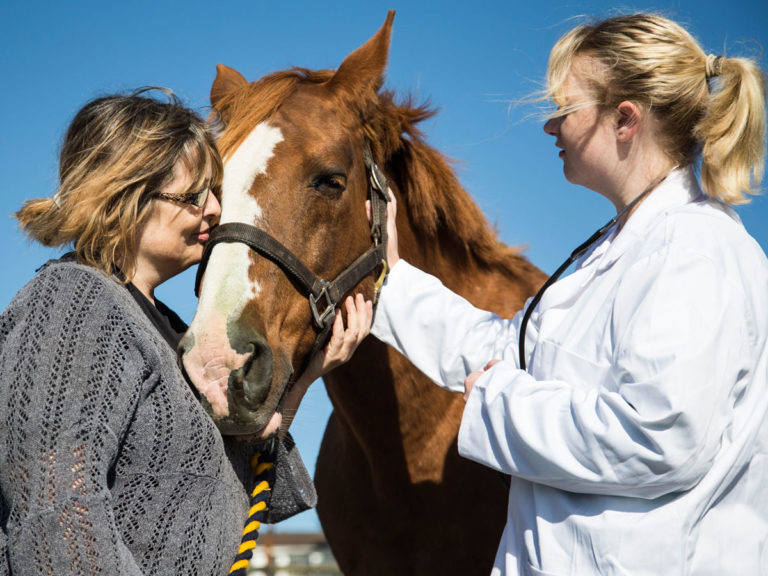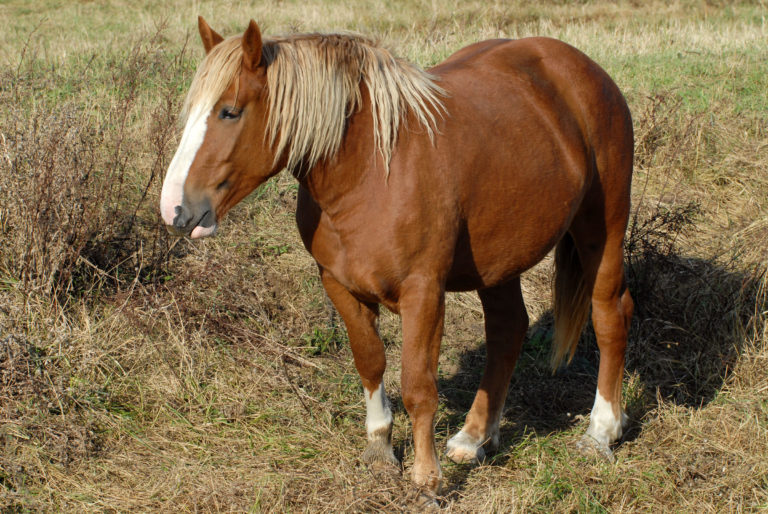
Freezing temperatures, deep snow and slick ice are challenges that horse owners often face during the winter months. For horse owners whose horses suffer from osteoarthritis (OA), these winter elements can make the disease more difficult to manage.
A horse with OA suffers from deterioration of the cartilage, bone and soft tissue in and around their joints. These changes often cause pain, deformity, loss of motion and decreased function. While the carpus, fetlock, hock and stifles are most commonly affected, any joint has the potential to develop OA. Though OA is not curable, there are a few ways to manage the disease.1
Tip #1: Be able to recognize the signs of osteoarthritis
It’s impossible to manage something that you don’t know is happening. Recognizing the signs of osteoarthritis is the first step in making sure your horse stays comfortable during the winter months. Sarah Reuss, VMD, DACVIM, Equine Technical Manager, Boehringer Ingelheim, says horse owners can be on the lookout for the following clinical signs of OA:
- Decreased activity or mobility
- Joint stiffness or decreased movement in the joint
- Heat and/or swelling of the joint
- Pain
- Lameness
In the winter, these signs might become more obvious due to the changes in temperature that can put more stress on the affected joints.2
Tip #2: Keep your horse moving
Once you’ve identified the signs of OA and your horse has been diagnosed by a veterinarian, you can begin managing the signs. The easiest way to do this is to simply keep your horse moving.
“A large part in keeping a horse with OA comfortable is ensuring they stay fit and get their joints moving, especially in colder weather,” says Reuss. “It’s important to include a proper warm-up and cool-down before and after work, as well as making sure that the work isn’t excessive.”
Whether it’s turnout, hand walking, groundwork, riding or a combination of the above, sticking to a training program will help loosen up your horse’s joints and keep them supple.3
Tip #3: Decrease inflammation with non-steroidal anti-inflammatory drugs (NSAIDs)
Talk to your veterinarian about using NSAIDs to help reduce overall pain and inflammation. There are many different NSAID options available, but your veterinarian will be able to determine which product will work best for your horse.
Equioxx® (firocoxib) is the first coxib NSAID to be FDA-approved for use in horses. EQUIOXX comes in tablet form that only needs to be given once a day, providing your horse with 24-hour pain relief. EQUIOXX contains firocoxib, which inhibits the inflammation-producing enzymes (Cyclooxygenase-2) while sparing the enzyme (Cyclooxygenase-1) that safeguards several normal body functions, including stomach protection.*
Another option is Surpass® (1% diclofenac sodium), the only FDA-approved topical NSAID for horses that can be applied directly on the source of inflammation to control pain and inflammation in joints affected by OA.4,5
*Clinical relevance has not been determined.
Tip #4: Maintain general winter best practices
Though horses with OA require special maintenance to keep them comfortable, owners should not overlook their normal winter needs. Like any horse in the winter, they should be turned out as often as safely possible, being conscious of the footing. Riders should also avoid riding in deep, heavy or wet snow in order to prevent tendon injuries.3
Unfortunately, OA is not curable, but by following these tips and working with your veterinarian the winter months can be more comfortable for both you and your horse.
EQUIOXX IMPORTANT SAFETY INFORMATION
As with any prescription medication, prior to use, a veterinarian should perform a physical examination and review the horse’s medical history. A veterinarian should advise horse owners to observe for signs of potential drug toxicity. As a class, nonsteroidal anti-inflammatory drugs might be associated with gastrointestinal, hepatic and renal toxicity. Use with other NSAIDs, corticosteroids or nephrotoxic medication should be avoided. EQUIOXX has not been tested in horses less than 1 year of age or in breeding horses, or pregnant or lactating mares.
SURPASS IMPORTANT SAFETY INFORMATION
Like any medication, non-steroidal anti-inflammatory drugs (NSAIDs) such as SURPASS might cause side effects. These are usually mild and affect primarily the gastrointestinal system, but more serious side effects, such as diarrhea and renal toxicity, may occur. NSAIDs should only be administered under the direction of a licensed professional. SURPASS topical cream is only approved for use in horses and has not been evaluated in breeding, pregnant, or lactating horses, or in horses under 1 year of age. Do not exceed the recommended dose. Wear gloves when administering SURPASS. If direct contact with skin occurs, wash immediately with soap and water. Please refer to the package insert for complete product information.
About Boehringer Ingelheim Animal Health USA
Boehringer Ingelheim Animal Health is working on first-in-class innovation for the prediction, prevention, and treatment of diseases in animals. For veterinarians, pet owners, producers, and governments in more than 150 countries, we offer a large and innovative portfolio of products and services to improve the health and well-being of companion animals and livestock.
As a global leader in the animal health industry and as part of the family-owned Boehringer Ingelheim, we take a long-term perspective. The lives of animals and humans interconnect in deep and complex ways. We know that when animals are healthy, humans are healthier too. By using the synergies between our Animal Health and Human Pharma businesses and by delivering value through innovation, we enhance the health and well-being of both.
Boehringer Ingelheim Animal Health has deep roots in the U.S. From a start in St. Joseph, Missouri, more than 100 years ago, it has grown to encompass seven sites. Boehringer Ingelheim Animal Health’s portfolio contains widely used and well-respected vaccines, parasite-control products and therapeutics for pets, horses and livestock including NexGard®, Heartgard®, Pyramid® + Presponse®, VAXXITEK®, Ingelvac CircoFLEX® and Prascend®.
Learn more about Boehringer Ingelheim Animal Health USA at bi-animalhealth.com
References:
1Oke S. What you need to know about equine osteoarthritis. Available at: https://thehorse.com/164328/what-you-need-to-know-about-equine-osteoarthritis/ Accessed August 26, 2022.
2Paturel A. Why is arthritis worse in the winter? Available at https://www.cedars-sinai.org/blog/arthritis-worse-in-winter-winter.htmlAccessed August 29, 2022.
3University of Minnesota, Extension, Caring for your horse in the winter. Available at https://extension.umn.edu/horse-care-and-management/caring-your-horse-winter#cooling-down–52661 Accessed August 29, 2022.
4SURPASS Freedom of Information Summary. Greensboro, NC: IDEXX Pharmaceuticals, Inc.; 2004
5Caldwell FJ, Mueller PO, Lynn RC, Budsberg SC. Effect of topical application of diclofenac liposomal suspension on experimentally induced subcutaneous inflammation in horses. Am J Vet Res. 2004;65(3):271–276.








